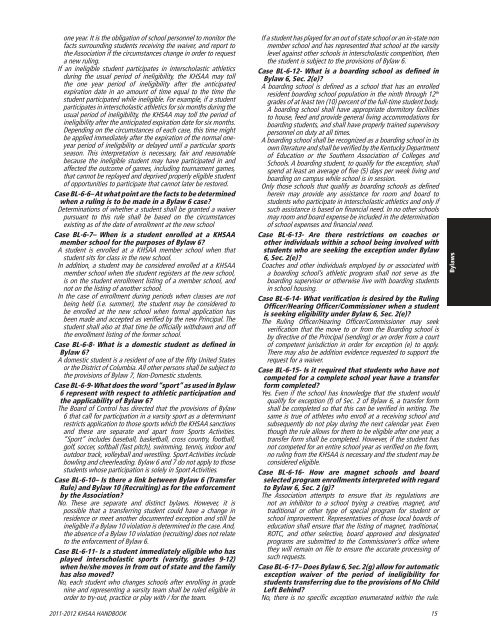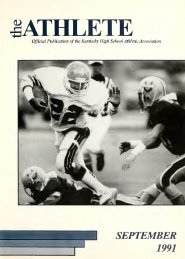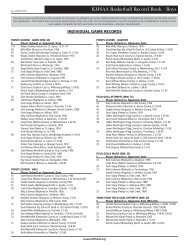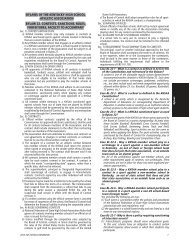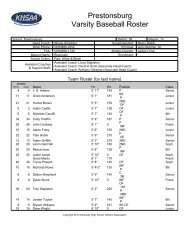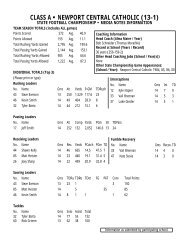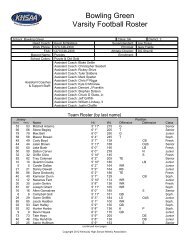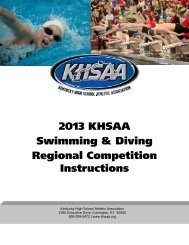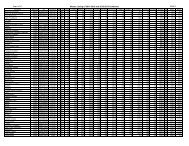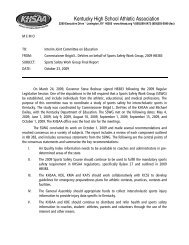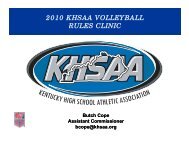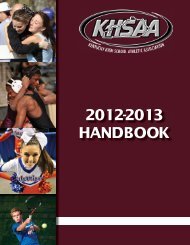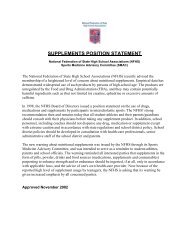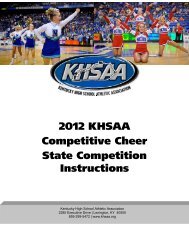20112012 Handbook - Kentucky High School Athletic Association
20112012 Handbook - Kentucky High School Athletic Association
20112012 Handbook - Kentucky High School Athletic Association
Create successful ePaper yourself
Turn your PDF publications into a flip-book with our unique Google optimized e-Paper software.
one year. It is the obligation of school personnel to monitor the<br />
facts surrounding students receiving the waiver, and report to<br />
the <strong>Association</strong> if the circumstances change in order to request<br />
a new ruling.<br />
If an ineligible student participates in interscholastic athletics<br />
during the usual period of ineligibility, the KHSAA may toll<br />
the one year period of ineligibility after the anticipated<br />
expiration date in an amount of time equal to the time the<br />
student participated while ineligible. For example, if a student<br />
participates in interscholastic athletics for six months during the<br />
usual period of ineligibility, the KHSAA may toll the period of<br />
ineligibility after the anticipated expiration date for six months.<br />
Depending on the circumstances of each case, this time might<br />
be applied immediately after the expiration of the normal oneyear<br />
period of ineligibility or delayed until a particular sports<br />
season. This interpretation is necessary, fair and reasonable<br />
because the ineligible student may have participated in and<br />
affected the outcome of games, including tournament games,<br />
that cannot be replayed and deprived properly eligible student<br />
of opportunities to participate that cannot later be restored.<br />
Case BL-6-6– At what point are the facts to be determined<br />
when a ruling is to be made in a Bylaw 6 case?<br />
Determinations of whether a student shall be granted a waiver<br />
pursuant to this rule shall be based on the circumstances<br />
existing as of the date of enrollment at the new school<br />
Case BL-6-7– When is a student enrolled at a KHSAA<br />
member school for the purposes of Bylaw 6?<br />
A student is enrolled at a KHSAA member school when that<br />
student sits for class in the new school.<br />
In addition, a student may be considered enrolled at a KHSAA<br />
member school when the student registers at the new school,<br />
is on the student enrollment listing of a member school, and<br />
not on the listing of another school.<br />
In the case of enrollment during periods when classes are not<br />
being held (i.e. summer), the student may be considered to<br />
be enrolled at the new school when formal application has<br />
been made and accepted as verifi ed by the new Principal. The<br />
student shall also at that time be offi cially withdrawn and off<br />
the enrollment listing of the former school.<br />
Case BL-6-8- What is a domestic student as defi ned in<br />
Bylaw 6?<br />
A domestic student is a resident of one of the fi fty United States<br />
or the District of Columbia. All other persons shall be subject to<br />
the provisions of Bylaw 7, Non-Domestic students.<br />
Case BL-6-9- What does the word “sport” as used in Bylaw<br />
6 represent with respect to athletic participation and<br />
the applicability of Bylaw 6?<br />
The Board of Control has directed that the provisions of Bylaw<br />
6 that call for participation in a varsity sport as a determinant<br />
restricts application to those sports which the KHSAA sanctions<br />
and these are separate and apart from Sports Activities.<br />
“Sport” includes baseball, basketball, cross country, football,<br />
golf, soccer, softball (fast pitch), swimming, tennis, indoor and<br />
outdoor track, volleyball and wrestling. Sport Activities include<br />
bowling and cheerleading. Bylaw 6 and 7 do not apply to those<br />
students whose participation is solely in Sport Activities.<br />
Case BL-6-10– Is there a link between Bylaw 6 (Transfer<br />
Rule) and Bylaw 10 (Recruiting) as for the enforcement<br />
by the <strong>Association</strong>?<br />
No. These are separate and distinct bylaws. However, it is<br />
possible that a transferring student could have a change in<br />
residence or meet another documented exception and still be<br />
ineligible if a Bylaw 10 violation is determined in the case. And,<br />
the absence of a Bylaw 10 violation (recruiting) does not relate<br />
to the enforcement of Bylaw 6.<br />
Case BL-6-11- Is a student immediately eligible who has<br />
played interscholastic sports (varsity, grades 9-12)<br />
when he/she moves in from out of state and the family<br />
has also moved?<br />
No, each student who changes schools after enrolling in grade<br />
nine and representing a varsity team shall be ruled eligible in<br />
order to try-out, practice or play with / for the team.<br />
If a student has played for an out of state school or an in-state non<br />
member school and has represented that school at the varsity<br />
level against other schools in interscholastic competition, then<br />
the student is subject to the provisions of Bylaw 6.<br />
Case BL-6-12- What is a boarding school as defi ned in<br />
Bylaw 6, Sec. 2(e)?<br />
A boarding school is defi ned as a school that has an enrolled<br />
resident boarding school population in the ninth through 12 th<br />
grades of at least ten (10) percent of the full-time student body.<br />
A boarding school shall have appropriate dormitory facilities<br />
to house, feed and provide general living accommodations for<br />
boarding students, and shall have properly trained supervisory<br />
personnel on duty at all times.<br />
A boarding school shall be recognized as a boarding school in its<br />
own literature and shall be verifi ed by the <strong>Kentucky</strong> Department<br />
of Education or the Southern <strong>Association</strong> of Colleges and<br />
<strong>School</strong>s. A boarding student, to qualify for the exception, shall<br />
spend at least an average of fi ve (5) days per week living and<br />
boarding on campus while school is in session.<br />
Only those schools that qualify as boarding schools as defi ned<br />
herein may provide any assistance for room and board to<br />
students who participate in interscholastic athletics and only if<br />
such assistance is based on fi nancial need. In no other schools<br />
may room and board expense be included in the determination<br />
of school expenses and fi nancial need.<br />
Case BL-6-13- Are there restrictions on coaches or<br />
other individuals within a school being involved with<br />
students who are seeking the exception under Bylaw<br />
6, Sec. 2(e)?<br />
Coaches and other individuals employed by or associated with<br />
a boarding school’s athletic program shall not serve as the<br />
boarding supervisor or otherwise live with boarding students<br />
in school housing.<br />
Case BL-6-14- What verifi cation is desired by the Ruling<br />
Offi cer/Hearing Offi cer/Commissioner when a student<br />
is seeking eligibility under Bylaw 6, Sec. 2(e)?<br />
The Ruling Offi cer/Hearing Offi cer/Commissioner may seek<br />
verifi cation that the move to or from the Boarding school is<br />
by directive of the Principal (sending) or an order from a court<br />
of competent jurisdiction in order for exception (e) to apply.<br />
There may also be addition evidence requested to support the<br />
request for a waiver.<br />
Case BL-6-15- Is it required that students who have not<br />
competed for a complete school year have a transfer<br />
form completed?<br />
Yes. Even if the school has knowledge that the student would<br />
qualify for exception (f) of Sec. 2 of Bylaw 6, a transfer form<br />
shall be completed so that this can be verifi ed in writing. The<br />
same is true of athletes who enroll at a receiving school and<br />
subsequently do not play during the next calendar year. Even<br />
though the rule allows for them to be eligible after one year, a<br />
transfer form shall be completed. However, if the student has<br />
not competed for an entire school year as verifi ed on the form,<br />
no ruling from the KHSAA is necessary and the student may be<br />
considered eligible.<br />
Case BL-6-16- How are magnet schools and board<br />
selected program enrollments interpreted with regard<br />
to Bylaw 6, Sec. 2 (g)?<br />
The <strong>Association</strong> attempts to ensure that its regulations are<br />
not an inhibitor to a school trying a creative, magnet, and<br />
traditional or other type of special program for student or<br />
school improvement. Representatives of those local boards of<br />
education shall ensure that the listing of magnet, traditional,<br />
ROTC, and other selective, board approved and designated<br />
programs are submitted to the Commissioner’s offi ce where<br />
they will remain on fi le to ensure the accurate processing of<br />
such requests.<br />
Case BL-6-17– Does Bylaw 6, Sec. 2(g) allow for automatic<br />
exception waiver of the period of ineligibility for<br />
students transferring due to the provisions of No Child<br />
Left Behind?<br />
No, there is no specifi c exception enumerated within the rule.<br />
2011-2012 KHSAA HANDBOOK 15<br />
Bylaws Bylaws


